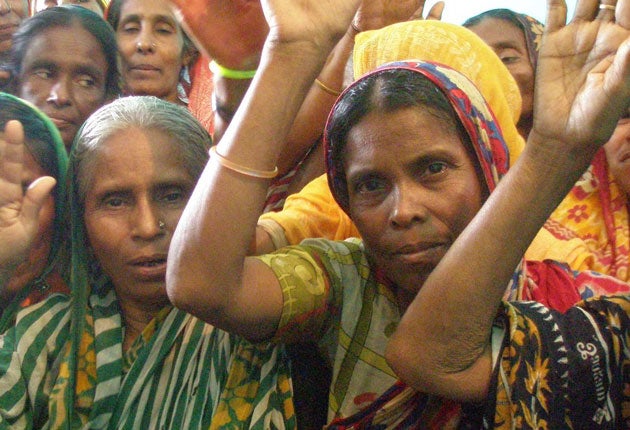Independent Appeal: After a life of suffering, Malika finds change to believe in
A drop-in centre in the Bangladeshi capital teaches women practical skills and builds self-confidence

This Liberation Day, as on every other, Malika Begum thought of the people she had lost. Her mother and father and some of her brothers were killed in the chaos of partition when the family was forced to move from their home near Calcutta to the newly created East Pakistan. Twenty-five years later her husband was tortured during the uprising that resulted in the rebranding of East Pakistan as Bangladesh and the birth of a new nation. He died from his injuries several years later.
Now aged 60, Mrs Begum wipes away her tears as she tells how she has endured a life of suffering, how six of her 11 children died from malnutrition. Even now, grey-haired and worn-down, she toils as a domestic worker to get money for her extended family.
But a year ago, Mrs Begum's daughter-in-law took her to a self-help group in Dhaka established for women who could use a little assistance. In different ways, the group has helped both women.
For Mrs Begum, the group has provided her with the company of women who are likewise struggling: Muslims, Hindus, married women, widows, migrants and those from Dhaka, all are members of the Floating Women's Forum, so named because its members are all in some way cut adrift from Bengali society. The group is supported by One World Action, one of the charities which is supported by The Independent Christmas appeal.
"I have been hurt by two wars: partition and the War of Liberation," says Mrs Begum, who has been attending the group's adult education classes. The classes have helped her marry what she learns of history with her own personal experience.
She was just seven when India was divided into two separate nations, she explains. Hundreds of thousands of Muslims and Hindus were killed in the subsequent violent turmoil, among them her parents.
At the age of 11, she married a man five years older then her. He worked as a rickshaw driver in the country's Khulna district. In addition to the tragedy of losing six children, Mrs Begum also lost her husband, ultimately as a result of the turmoil of the 1971 uprising that led to the birth of Bangladesh – an event celebrated every year on 16 December. Revolutionaries who mistook her husband for an ally of Pakistan, the country from which they were seeking freedom, tortured him severely. Mrs Begum says he never recovered his health, and seven years later he died, leaving his wife to struggle on alone.
The extended family in which Mrs Begum now lives is headed by 19-year-old Jahanara. This young woman is married to one of Mrs Begum's sons, a man who suffers from a mental disability. His condition means he is able to earn very little money, and as a result Jahanara has been forced to take responsibility for the family. One way in which the self-help group has been able to assist Jahanara is by providing her with a strategy for developing other forms of income. At this humble drop-in centre in the dusty Mirpur district of the sprawling Bangladeshi capital, the women are taught candle-making, simple sewing and other skills such as batik printing. It has enabled women such as Jahanara to earn considerably more money than they previously could. It is still a pitifully low amount – perhaps £35 a month – but in a country where an estimated 83 per cent of the population survives on less than £1.40 a day, it can make a crucial difference. She says: "I have been studying embroidery and making kurtas" (traditional, open-collared shirts). "My husband's earnings are very low and now I am the main earner for the family. The family is better off since I have been coming here. I take orders for clothes from the community. All of the responsibility is with me."
Another woman, Nazma, also 19, says she too has been learning to make candles and to sew. The money she has been able to earn – around £30 a month – has greatly helped her family and has boosted her position within it. "Now I can participate in decision-making," she says. "Before, I didn't earn anything and my parents thought I was a burden."
As Nazma testifies, the self-help group, funded by the Bangladeshi NGO Nagorik Uddyog, a partner of One World Action, has done more than provide incomes.
In a country where women are routinely afforded few rights and often treated as little more than possessions, the groups have provided them with confidence, skills and inspiration. Jahanara is among the volunteer leaders trained by the self-help group.
"A big problem is the Islamic culture [of Bangladesh]. We are not allowed a voice," says Feroza Begum, head of another NGO involved in the project. "We need policies to help women's empowerment, we need access to contraception. Many of the husbands do not like their wives to come to this organisation. They want to keep us down.
"But when they see that the women can earn money, then the men stop saying that and they see the benefits."
Another of the leaders, Lovely Yasmin, is passionate about the power of poor women acting together. She has travelled to international conferences to listen to other women speak and to share with them the success of their project in Dhaka and of their future dreams. "We are not educated people and we don't have money, but we have a lot of power within ourselves," she says. "It's a challenge, but we want women to become more powerful. We want to change our society. This is our challenge and this is our goal."
Join our commenting forum
Join thought-provoking conversations, follow other Independent readers and see their replies
Comments